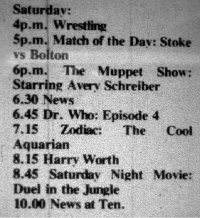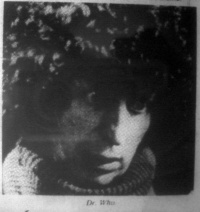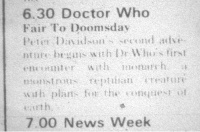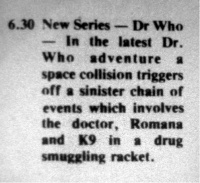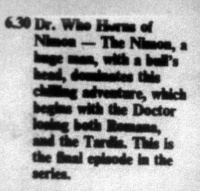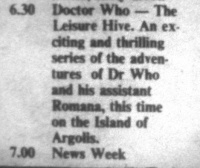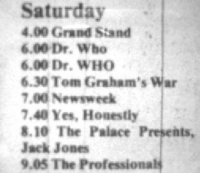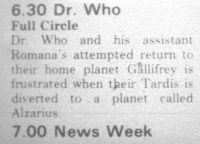Swaziland
SWAZILAND is in the south of Africa, bordered by South Africa and Mozambique.
Profile
| Country Number (N/K) | 1978 | SECOND WAVE |
| Region | Africa | Commonwealth |
| Television commenced | 1 February 1978 | |
| Colour System | 1 February 1978 | PAL |
| Population | 1980 | 450,000 |
| TV Sets | 1980 | 500 |
| Language/s | English |
Television Stations / Channels
Swaziland began its television service on 1 February 1978, adopting the PAL colour broadcast system. There is just one television station: Swaziland Television Broadcasting Corporation (STBC), a government-owned commercial broadcaster.
Despite the size of the population, very few people had televisions in the first few years, with only 500 sets licensed by 1980.
The official language of Swaziland is English.
DOCTOR WHO IN SWAZILAND
Swaziland was the about the 43rd country to screen Doctor Who; it was the 14th in Africa since 1965 (see Selling Doctor Who). Interestingly, it was the only new African country during the SECOND WAVE of sales.
BBC Records
The Eighties - THE LOST CHAPTERS records a sale of "(30)" stories (by 10 February 1987).
In DWM, Swaziland is identified in 4 story Archives: XXX, YYY in 1978, and 4A, 4B, in 1979.
The listing for XXX is an error, as it is recorded in other BBC records, that the sale of that story to Swaziland was subsequently cancelled. These same records indicate that the following four Pertwee stories were sold. The identity of all the Tom Baker stories has not been determined.
Stories bought and broadcast
JON PERTWEE
Four stories, 18 episodes:
| AAA | Spearhead from Space | 4 |
| RRR | The Three Doctors | 4 |
| UUU | The Time Warrior | 4 |
| YYY | The Monster of Peladon | 6 |
The programme was supplied as PAL colour video tapes with English soundtracks.
Interestingly, these same four Jon Pertwee stories were also sold around the same time to Malta, Sierra Leone and Sri Lanka.
TOM BAKER
25 stories, 102 episodes (the first 16 of these are assumed):
| 4A | Robot | 4 |
| 4B | The Sontaran Experiment | 2 |
| 4C | The Ark in Space | 4 |
| 4E | Genesis of the Daleks | 6 |
| 4D | Revenge of the Cybermen | 4 |
| 4F | Terror of the Zygons | 4 |
| 4H | Planet of Evil | 4 |
| 4G | Pyramids of Mars | 4 |
| 4J | The Android Invasion | 4 |
| 4K | The Brain of Morbius | 4 |
| 4L | The Seeds of Doom | 6 |
| 4M | The Masque of Mandragora | 4 |
| 4N | The Hand of Fear | 4 |
| 4P | The Deadly Assassin | 4 |
| 4Q | The Face of Evil | 4 |
| 4R | The Robots of Death | 4 |
| . | 4 unidentified 4 parters | 16 |
| 5K | Nightmare of Eden | 4 |
| 5L | The Horns of Nimon | 4 |
| 5N | The Leisure Hive | 4 |
| 5Q | Meglos | 4 |
| 5R | Full Circle | 4 |
Swaziland therefore bought most of GROUPs A, B, C, and F of the Tom Baker stories.
The programme was supplied as PAL colour video tapes with English soundtracks.
PETER DAVISON
One story, 4 episodes:
| 5W | Four to Doomsday | 4 |
Swaziland therefore bought one story from GROUP A of the Peter Davison stories.
The programme was supplied as PAL colour video tapes with English soundtracks.
Transmission
JON PERTWEE
Three days after television transmissions commenced in Swaziland, viewers saw Doctor Who; the series started on Saturday, 4 February 1978, at 6.30pm. The first story was Spearhead from Space. The other three stories - see the above table – were all that were left of the PAL colour Jon Pertwee stories that were still available at the time.
Mid-way through the run, the timeslot changed to 6.45pm. After a run of 18 episodes, the series ended on 3 June 1978. (NOTE: The TV listings for 3 June record Match of the Day with its usual 5.00pm start time, followed by The Muppet Show, but Doctor Who is missing from its 6.45pm timeslot; but it must have aired, otherwise the final episode of The Monster of Peladon is unaccounted for.)
TOM BAKER
When the series returned nine months later, on Saturday, 17 February 1979 – it was with a new Doctor. This may have been somewhat confusing for viewers (all 160 of them!), especially since Planet of the Spiders had not screened.
The new series aired at 6.00pm for all episodes. This 14 week run ended on 19 May. This run was, presumably Robot through to Revenge of the Cybermen, with all stories screening – we again presume - in production code order.
The third run of episodes began seven months later, on Saturday, 5 January 1980, at 6.30pm. This was another 14 week run, concluding on 5 April 1980. Assuming the stories aired in production code order, the run most likely ended with Pyramids of Mars.
The series returned for its fourth run on Saturday, 8 November 1980. This was the longest run, lasting 39 weeks (with a break on 20 June 1981 due to the TV coverage of a sporting event). Picking up from where the previous run left off, this would have started with Planet of Evil, and concluded with The Robots of Death?
After a short break, the series was back on Saturday, 26 September 1981, at 6.00pm, ending 9 January 1982. For this 16 week run, there would have been four 4-parters, or two 6-parters and one 4-parter. Since The Eighties records a sale of 30 stories, the former combination does contribute towards the tally of 30, whereas the latter would only allow for 29.
(At a guess, three of the 'unknown' stories were Destiny of the Daleks, City of Death and The Creature from the Pit. But as for the fourth 4-parter... it would have to be a stray serial from season 15, as it's unlikely that one of the Key to Time stories would air all on its own – but then again, have a look at Seychelles...)
Eight months on, Nightmare of Eden (Hooray! The papers finally give story titles!) aired on Saturday, 18 September 1982. This short 8-week run, ended on 6 November, with part four of The Horns of Nimon.
After another long break of nine months, The Leisure Hive opened the seventh run, which ran for 16 weeks: 6 August 1983 to 19 November 1983. Only the first three stories from Tom Baker's final season aired.
PETER DAVISON
The seventh run of episodes concluded with Peter Davison's second adventure, Four to Doomsday (which was the first story he recorded). The last episode aired on 19 November 1983.
124 episodes of Doctor Who screened in Swaziland over a six year period, 1978 to 1983. This had been made up of four Pertwees, 25 Bakers, and one Davison, which indeed adds up to 30, as is recorded in The Eighties.
There is no clear record that Swaziland screened Doctor Who again.
TV listings
| ← AIRDATES ...... (CLICK ICON TO GO TO TABLE SHOWING EPISODE BREAKDOWN AND AIRDATES - N/S = story title is Not Stated) |
TV listings have been obtained from Times of Swaziland and The Swazi Observer.
The majority of listings gave the series name as "Dr Who". Towards the end of the run, it fluctuated between that and Doctor Who in full. In The Swazi Observer of 11 July 1981, a setting error saw the 6.00pm listings duplicated: "Dr Who" followed by "Dr WHO". And on 23 October 1982, it was: "Dr Who?" (complete with question mark).
There were no TV listings in the 4 February 1978 paper, but it's clear that Doctor Who must have aired the week that television broadcasts commenced in Swaziland, given that there are 18 episodes to be accounted for in the first run.
The 20 May 1978 episode was simply billed as "Dr Who: Episode 4"; this was part four of The Monster of Peladon.
None of the listings gave story titles until the 101st episode, which, from the published synopsis, was Nightmare of Eden.
For the short 8-week run in late 1982, the first five episodes were given a short synopsis that described Nightmare of Eden; the last one must have been an error. The second episode of this run was illustrated with a photo of Tom Baker (see image above). The final two episodes did give the title as "Horns of Nimon" (sic).
For the final run, the first (billed as The Leisure Hive) and second episodes were set "on the island of Argolis". The next story was billed as Meglos for two if its episodes. The third serial was either billed as Full Circle, or gave a synopsis for that adventure. The thirteenth episode of the run, 29 October 1983, was billed as "Fair To Doomsday". The billing said it was Peter Davidson's (sic) second story, and yet this was the first and only one of his to screen! All three of the final episodes were listed as being Full Circle, which must have been a printing error, rather than an indication that Full circle aired twice.
Swaziland in Doctor Who
- Actor Richard E Grant, who played the ninth Doctor in the 2003 web-cast adventure, Scream of the Shalka, grew up in Swaziland. He says he had never seen Doctor Who, although it had certainly been on for a few years by the time he left Swaziland in 1982.
